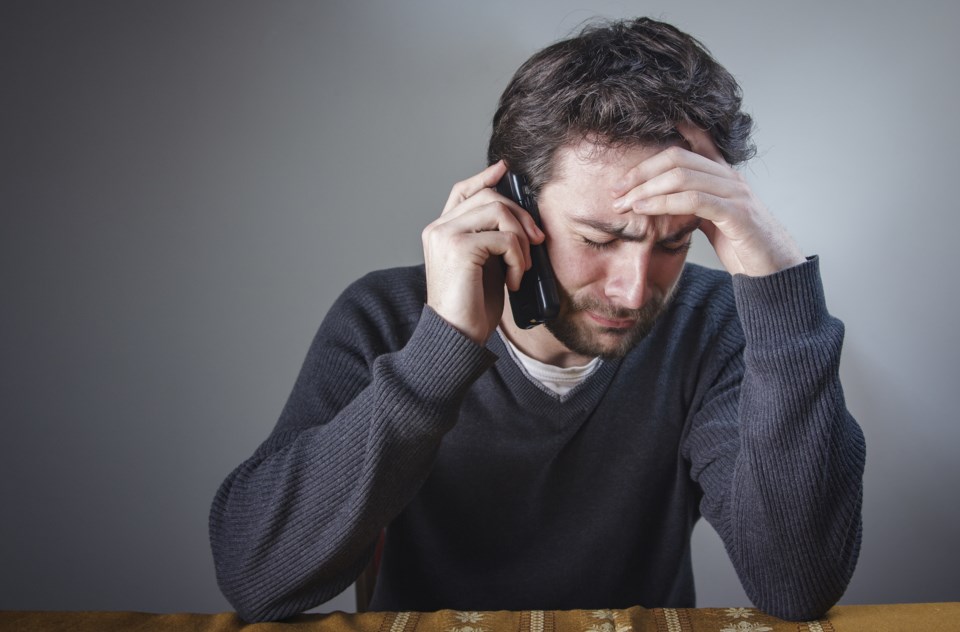Local mental health services have seen a significant spike in anxiety-related calls related to COVID-19 in the past week.
“Right now we’re dealing with probably 100 per cent more calls than we normally receive,” said Joanne Young Evans, executive director of Family Counselling and Support Services for Guelph-Wellington.
Evans said her team is overwhelmed with the jump in calls on their hotline from individuals experiencing anxiety in relation to isolation, unemployment, rent and concern for their children and elders in their family.
She said with a target of 415 walk in subsidized sessions for the current fiscal year (which ends March 31), the centre had already handled 2,071 sessions by Wednesday.
“It’s astronomical,” said Evans.
“We were quite overwhelmed with the number of people at that clinic people showing anxiety and if they had signs of depression, their depression was increasing.”
With the centre switching to virtual consultations rather than in-person to reduce the risk of transmitting the virus, Evans said the centre is working through a number of different models to help individuals deal with their specific issues.
“People’s routines are disturbed and people like routine. You can’t go to the coffee shop and go and chat with your friends,” said Evans adding that people are searching for new ways to live.
The Canadian Mental Health Association Waterloo Wellington has also seen spikes in their call volume in the last couple of days with anxiety-related calls.
“We have people in full out panic,” said senior director of the CMHA Waterloo Wellington, Helen Fishburn.
She said when comparing Here 24/7 with other phone lines in the community that are testing for physical issues, the numbers are off the charts.
Just from five days ago, the CMHA Waterloo Wellington has seen a 54 per cent increase in calls from people who are distressed, overwhelmed and anxious as a result of COVID-19.
“There has been so much focus on the physical health part of the coronavirus and not the actual mental health part,” said Fishburn about the growing anxiety in relation to the virus.
“One of our key messages is that the fear is spreading faster than the actual virus.”
She said the population at CMHA is naturally elevated with anxiety and other medical conditions and now with the virus, there is a heightened sense of panic and anxiety.
“We’re seeing it across the community,” said Fishburn about people in the community who are responding to the crisis with anxiety-related behaviour such as panic purchasing.
She said when The COVID-19 Assessment Clinic, run by the Guelph Family Health Team opened on Wednesday, there was a lineup down the street.
“There’s just so much fear around people’s physical symptoms and wanting to be reassured that they do not have this virus. It’s showing up in pockets everywhere,” said Fishburn.
She says the best practice to manage the virus is to remain socially isolated and virtually connected to the care system.
All family doctor visits with the CMHA Waterloo Wellington have been virtual by phone or video. However, high-risk mental health and addiction patients who need injections or crisis assessments are still being seen in person by appointment.
“We’re really saying to people to stay in your home, stay grounded, stay connected, stay calm and there are many many ways you can have your needs met at home.”
Fishburn says the virtual care options they have adopted across their health care systems have proven to be very effective with members triaging patients and sharing a large amount of information over the phone and video.
“What we’re hearing from the community is that they’re very grateful to have these options because they don’t want to come into hospitals, they don’t want to come into a family doctor’s office because they know that it puts them at risk,” said Fishburn.
She said the association is implementing strategies such as cognitive behaviour therapy on the phone to help switch a person’s thought patterns to reduce anxiety.
“The more we can mitigate and slow down our thinking, the more that affects our behaviour. Because once you start to panic, your body actually responds physiologically," said Fishburn.
She said another major issue that is arising is parents’ uncertainty on how to talk to their kids about the pandemic. With parents working from home and kids away from school, routines have changed.
“The kids no matter what age they are, whether they're three or 23, they know something is up. They know something is wrong. Even the little ones. They can sense their parents’ worry and sense their parents’ anxiety,” said Fishburn.
She said it’s important to have age-appropriate conversations with children while being factual and reassuring about the current situation in the world.
“Don’t overshare,” says Fishburn adding that part of an individual job as a parent is to help the child navigate through life’s challenges.
She says it’s important to power children up with techniques such as handwashing and information about the current situation to ultimately help them understand that no matter what life throws their way, they will go through it together.
